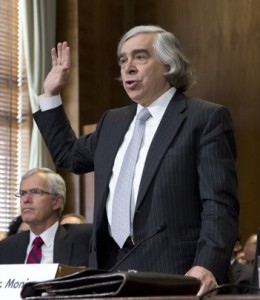 On Tuesday, April 9 the U.S. Senate Committee on Energy and Natural Resources convened to consider the nomination of Ernest Moniz as the next Secretary of Energy. The hearing itself was smooth, as Moniz received praise for his long career as a nuclear physicist. Moniz and the Senators discussed a number of key energy issues that will need to be addressed when Moniz becomes the next Energy Secretary.
On Tuesday, April 9 the U.S. Senate Committee on Energy and Natural Resources convened to consider the nomination of Ernest Moniz as the next Secretary of Energy. The hearing itself was smooth, as Moniz received praise for his long career as a nuclear physicist. Moniz and the Senators discussed a number of key energy issues that will need to be addressed when Moniz becomes the next Energy Secretary.
In his written testimony, Moniz stressed the Department of Energy’s important role in supporting the leadership efforts of the American scientific community. He said that it is important for the Department of Energy to support the current transition to a low-carbon energy system. This includes implementing President Obama’s “all of the above” energy strategy: supporting a robust portfolio of low-carbon energy options like renewables and nuclear, and allowing domestic oil and gas production to serve as a bridge to these low-carbon technologies.
Moniz also discussed the need to mitigate climate change. Supporting research and development in order to deal with climate change will be essential for the Department of Energy, and it should take a leading role in those efforts. He also discussed energy as a national security issue in his testimony; reducing our oil dependence for fuel transportation is very important for American energy security.
While the first few rounds of questioning dealt with the U.S. energy mix, one topic dominated the hearing throughout: natural gas exports. ASP has written about the geopolitical benefits of natural gas exports to Europe and Asia, and Moniz echoes these in his responses. He said that the boom in American natural gas production has allowed Europe to diversify their imports away from Russia. He balanced this point with the need to have stronger analysis on prices, in an attempt to address the concerns over the effects on domestic prices. Chairman Wyden in particular has expressed concerns over the effects of natural gas exports on consumer prices.
A number of Senators brought up nuclear waste issues, primarily those dealing with their home states. One big issue was the Hanford Site in Washington State, which is currently the most contaminated federal property in the United States. Moniz said that the status quo agreement on cleaning up the site was not acceptable. There are ongoing developments in the clean-up process, but there must be an adequate safety culture in place. He promised to visit the site and work with government and industry to develop a plan for clean-up. With regard to the Yucca Mountain facility, he said that he will advance the agenda of the propositions made by the Blue Ribbon Commission to deal with the nuclear waste problem.
Moniz made a number of other insights into energy issues during the round of questioning. He stated that he is very “bullish” on renewable energy; there is fantastic progress being made in reductions in the cost of solar and wind energy. He also talked about the need to increase the resilience of the electrical grid in order to make it less susceptible to natural disasters and cyber attacks. Finally, he mentioned Small Modular Reactor’s (SMR’s) as being an important part of the nuclear energy debate. He said that these designs are very promising, and they have great potential in lowering the cost of nuclear power.
Effectively managing the National Laboratories is an important part of the responsibilities of the Department of Energy, and he touched upon this. He said that labs should have more of their work performed by multidisciplinary teams. Labs work best, he added, when they have long term commitments to managing hard problems.
The hearing overwhelmingly focused on the commercial technologies of today, and unfortunately the Committee provided little inquiry into basic and applied R&D, innovation, and next-generation technologies – an essential role for DOE. For example, DOE oversees a research portfolio for fusion power, which promises clean, safe, secure and abundant energy. With the domestic fusion program in doubt due to budget cuts, it was disappointing that the Committee did not discuss this area of research.
One important point to take away from his hearing is that he really stressed the role of the Department of Energy as a supporter of innovation for scientific and technological projects. His optimism and enthusiasm toward accelerating the transition to a low-carbon energy economy bodes well for the future, and ASP looks forward to his leadership.


